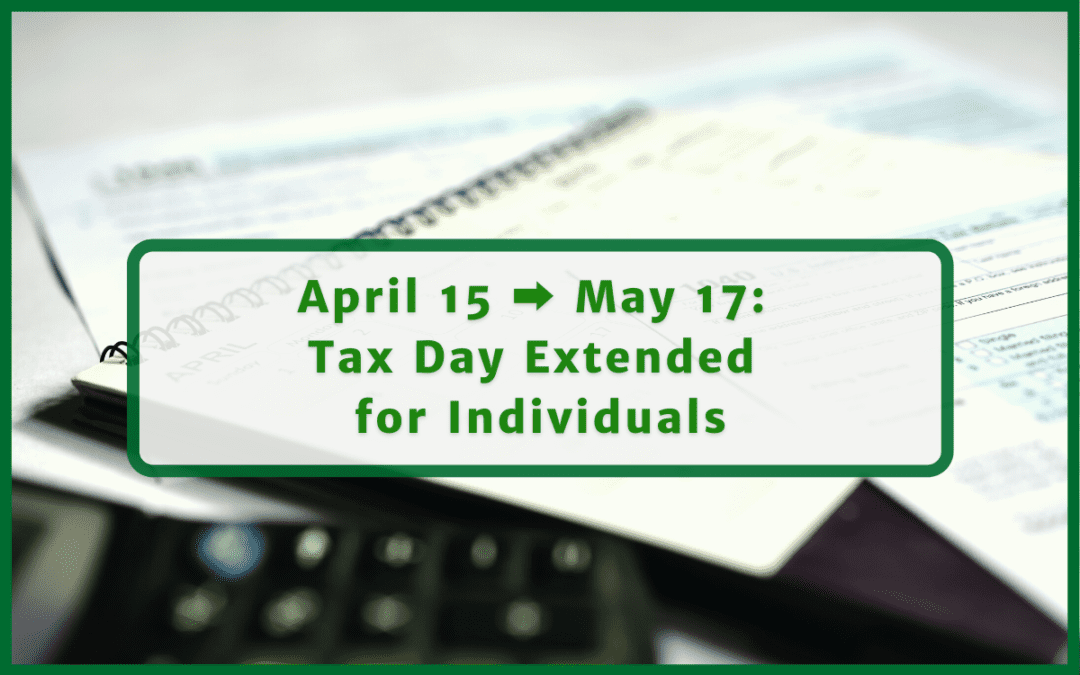Question: What started the year as a speculation, became a rumor, and finished out St Patrick’s day as fact?
Answer: Tax Day for individuals has been extended. Again.
That’s right. The individual federal tax due date has been extended. This year, it has been pushed back from April 15, 2021, to May 17, 2021, due to May 15 falling on Saturday. This time, the IRS answered the most pressing questions before The Treasury Department and Internal Revenue Service announced the automatic extension.
FAQs
Do I need to do anything to extend to May 15?
No. The extension is automatic. There is no form to file. Your return and any related payment for tax year 2020 are now due May 17, 2021.
I still need more time! What do I do?
Let us know. We’ll file an extension. The extended due date as of the writing of this article is still October 15, 2021.
Is my tax payment extended?
To avoid confusion – there are two payments that are typically due on April 15, the final income tax payment for tax year 2020 paid with your tax return and the 2021 first quarter income tax estimate.
Your tax return payment for any remaining tax for 2020 has been extended until May 17, 2021.
Your first quarter estimated tax payment for 2021 is still due on April 15, 2021.
What about my state tax return? Has that been extended?
Great question. All states treat this differently. For example, Colorado issues an automatic 6-month extension, so any return not filed as of April 15, 2021, will be considered extended. No additional action is required for Colorado.
You can check your state’s extension rules here.
Cause & Effect – Why Tax Day’s Been Pushed Back
In 2020, Tax Day was pushed back due to the pandemic. This year, the pandemic is still the root cause. The IRS Commissioner Chuck Rettig stated, “This continues to be a tough time for many people, and the IRS wants to continue to do everything possible to help taxpayers navigate the unusual circumstances related to the pandemic, while also working on important tax administration responsibilities.”
Those responsibilities largely have to do with the tax provisions included in the American Rescue Plan. In addition to the monumental task of qualifying and issuing the latest round of stimulus payments, the IRS has to issue guidance on a retroactive tax exemption on unemployment benefits.
The new law included in the American Rescue Plan provides an exemption on the first $10,200 of unemployment benefits received in 2020. This applies retroactively to the 2020 tax year. Coming in the middle of the filing season, this causes a bit of disruption. The IRS is issuing a worksheet for paper filers and working with tax preparation software vendors to incorporate the change appropriately. According to the NY Times, the IRS is asking tax filers who have already submitted their returns to wait for further guidance before filing an amended return.
It should be noted that states will be treating the unemployment income exemption differently based on each state’s tax statutes. For example, in Colorado, the tax statutes do not incorporate federal changes made after the taxable year’s last day. This means that unemployment income will be added back for state income tax purposes.
The extra month gives taxpayers a little more time to determine if they are affected, pull their financial documents together, or decide if it’s time to consult a tax pro.
Another Tax Year for the History Books
With the extended due date and late legislative changes, tax year 2020 is living up to its reputation. After all, we’re all ready to put 2020 in the rearview mirror! This tax year is already historical. It is only the second time the federal tax due date has been extended nationally since April 15 was adopted as the official Tax Day in 1955.
If you’re ready for some peace of mind and want to make your 2020 taxes history, give us a call. You can schedule a complimentary discovery call or contact us here.

